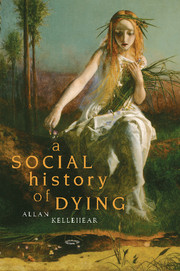Book contents
- Frontmatter
- Contents
- Acknowledgements
- Introduction
- Part I THE STONE AGE
- Part II THE PASTORAL AGE
- Part III THE AGE OF THE CITY
- Part IV THE COSMOPOLITAN AGE
- Chapter Ten The Exponential Rise of Modernity
- Chapter Eleven The Birth of the Shameful Death
- Chapter Twelve The Final Challenge: Timing Death
- Conclusion
- Bibliography
- Index
Chapter Ten - The Exponential Rise of Modernity
Published online by Cambridge University Press: 22 September 2009
- Frontmatter
- Contents
- Acknowledgements
- Introduction
- Part I THE STONE AGE
- Part II THE PASTORAL AGE
- Part III THE AGE OF THE CITY
- Part IV THE COSMOPOLITAN AGE
- Chapter Ten The Exponential Rise of Modernity
- Chapter Eleven The Birth of the Shameful Death
- Chapter Twelve The Final Challenge: Timing Death
- Conclusion
- Bibliography
- Index
Summary
The littlest animals in the world – and one of our biggest killers – are viruses. They are so small that they can even invade bacteria (Flint 1988). They travel rather lightly so they live without the power to reproduce themselves. Instead they use the replicating machinery of other animals to help them reproduce. In other words, viruses are parasites (Levine 1992). You wouldn't necessarily think that there was much in common between this smallest of all animals and human beings, not least because we don't often see ourselves as parasites (nor as animals). But the fact is that we – and all living organisms – are exactly like them in the most important way of all: from the virus to the human being, whale or oak tree, we all share information.
The Oxford zoologist Richard Dawkins (1986) shares a candid moment from his garden in his book The Blind Watchmaker that dramatically illustrates the centrality of this feature of organic life. From the bottom of his garden he describes how a large willow tree throws its seeds into the air, tossing these seedpods everywhere but particularly onto the water of a nearby canal. The seedpods fly up and away because of another feature they display – cottony wing-like attachments that act like parachutes for the seed cargo they carry. Inside each seed, itself a cargo bay of sorts, lies the real treasure: the DNA messages that will permit the growth of yet another willow tree.
- Type
- Chapter
- Information
- A Social History of Dying , pp. 191 - 212Publisher: Cambridge University PressPrint publication year: 2007



